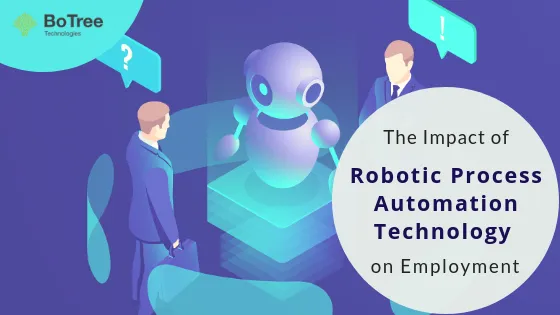

The Impact of Robotic Process Automation Technology on Employment
Everything you need to know about Robotic Process Automation
The robotic process automation market has nearly touched the $2 billion mark by the end of 2018 (Statistic). Robots are being employed at different levels in various industries to augment their business capabilities and enjoy high-profit margins on low investments. Robotic process automation services have become real game changers when it comes to enhancing the performance of business activities at a considerably lower cost than humans.
However, with this technological advancement, the human workforce is becoming increasingly aware of the threats that it might possess to their jobs. One of the major benefits of robotic process automation is that it is drastically more efficient than humans, reduces the time & maximizes the accuracy in tasks. Employees consider this as a threat because it has displayed all the potential to replace their jobs.

Will Robotic Process Automation Technology take over the Workforce?
Certainly not. In fact, advocates of RPA believe that deploying robots in the organizational structure and integrating them with the workforce will multiply the business performance. The result will be more time for employees & workforce to focus on productive, creative & decision-making that can be carried out with ease.
- Robotic process automation solutions are designed to attend mundane & menial jobs that bore the normal workforce. Tasks like data entry, application filing & sorting of information can drain the employees. RPA can quickly & efficiently complete these tasks leaving space for employees to breathe in more productive landscapes.
- Another benefit of robotic process automation is that companies can dramatically reduce their costs of offshore hiring which they have been outsourcing to third world countries since donkey’s years. The initial investment in automation can be expensive but once set up, it can eliminate 70% of costs that were spent on offshore employees.
- On the contrary to what most people believe, RPA will create jobs as it’s a new technology that needs people to monitor & manage its operations. It has created a completely new paradigm of expertise in the technological world give rise to companies that specialize in offer RPA services. RPA requires programming and the demand for programmers who are well equipped with these skills has seen an upsurge in recent times.
- Robotic process automation is focused on creating the workforce of the future. They will be aligned with human personnel to perform repetitive & mundane tasks that offer no value to their human counterpart. Once the organization refocuses its employees work with automation, it can lead to rewarding results on both sides.
Even though there are several takes on the evolution of robotic process automation technology, the truth is that it is here to stay. Instead of getting scared of this technology, employees must integrate their current work with it and explore the possibilities that RPA offers for more productive work. What RPA offers is freedom from mindless activities that only consumed time & money and can provide employees with a sense of fulfillment in their work as they focus on more creative & meaningful work.





